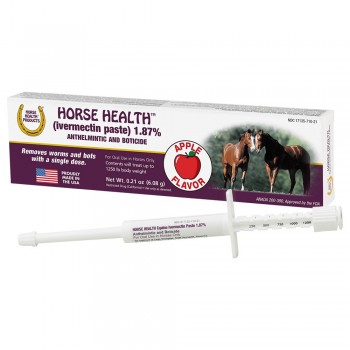





20999
Brand Varies - This apple-flavored Ivermectin paste dewormer provides effective treatment and control of most parasites in horses, removing worms and bots in a single dose.
This apple-flavored Ivermectin paste dewormer provides effective treatment and control of most parasites in horses, removing worms and bots in a single dose. It is effective on large and small strongyles, pinworms, ascarids, hairworms, large-mouth stomach worms, bots, lungworms, intestinal threadworms, and summer sores caused by Habronema and Draschia spp. cutaneous third-stage larvae. Ivermectin may come in cellophane wrap or in box.
Species: Horses
FEATURES / BENEFITS
Kills 35 species and stages of worms and bots combined
Kills all three stages of the two most common bot species
Use every other month (six times per year) for broad spectrum parasite control
One syringe treats a 1,250-pound horse
Safe and effective on all horses including broodmares, stallions, and foals
SPECIFICATIONS
Active Ingredient: 1.87% Ivermectin
Do not use in horses intended for food purposes.
INSTRUCTIONS
Syringe contains sufficient paste to treat one 1,250-pound horse at the recommended dose rate of 91 mcg ivermectin per pound (200 mcg/kg) body weight. Each weight marking on the syringe plunger delivers enough paste to treat 250 lbs. body weight.
All horses should be included in a regular parasite control program with particular attention being paid to mares, foals and yearlings. Foals should be treated initially at 6 to 8 weeks of age, and routine treatment repeated as appropriate. Consult your veterinarian for a control program to meet your specific needs.
A good rotation to keep in mind:
January/February Pyrantel
March/April Benzimidazole
May/June Ivermectin
July/August Pyrantel
Sept/October Benzmidazole
November/December Ivermectin